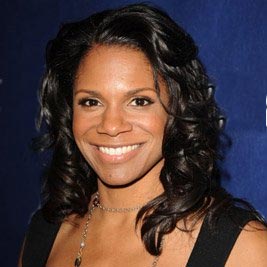 |
| Audra McDonald: The rare performer whose singing skill and acting ability are equally exceptional. Definitely good enough for Broadway. |
Singing showtunes is hard. No matter what those American Idol judges might think, musical theatre music is incredibly difficult and taxing on the voice. It requires a much wider range than pop music, and as a Broadway star you are expected to nail your songs eight times a week. Contemporary musicals are asking their leads to sing higher and longer than anything from the Golden Age, and the straight toned, pop-influenced sound these new shows practically demand is especially difficult to achieve while maintaining healthy vocal production.
And while they’re generally the most talented performers in the business, Broadway stars are only human. Sometimes they get sick, or their voices get tired, and they miss the occasional note or don’t have the most perfect tone. And sometimes the performer simply isn’t the best singer, but has other qualities that are essential to the role. All of this raises the question: just how high of a standard should we hold Broadway singers to?
When it’s time to evaluate the performances in a Broadway musical, you have to decide which is ultimately more important, acting or singing. Yes, Broadway is the top tier of the industry, and in an ideal world everyone would be a world class actor and singer. But the fact of the matter is most people, even the greats, are more adept in one area than the other, so as an audience member or a critic you still have to decide which discipline has a greater influence on the success of the show.
I would argue that even in a musical, acting ability is ultimately more important than vocal prowess. Ever since Rodgers and Hammerstein revolutionized the form with Oklahoma, the musical theatre has been primarily a story-driven medium. All the music is intended to further the story by communicating emotions that cannot be conveyed in mere dialogue. And it is therefore more important that the performer be able to embody the emotions of a song than to hit every note with perfect pitch and tone. Even in a show like Wicked, which is famous for the vocal demands it places on its leading ladies, it is more important that you feel Elphaba’s growing defiance and determination during “Defying Gravity” than hearing her sing every run perfectly.
That said, singing ability is obviously important. To continue with the same example, it would be extremely difficult for an audience to focus on the emotion of “Defying Gravity” if they are constantly distracted by wrong notes and poor tone. The lower the vocal proficiency of a person, the better actor they must be so that you connect emotionally with the song and the character despite some missed notes and poor tone.
You also must take into account the individual song and the show they appear in, as different types of music require different levels of vocal accomplishment. A cute comedy number like “A Bushel and a Peck” from Guys and Dolls doesn’t demand the same level of singing talent as a soaring ballad like “I Have a Love” from West Side Story. And as a general rule, revivals of well-known shows are going to require a higher caliber of singer than new works, because the more productions of a show that exist, the greater the chance that the audience has heard an excellent rendition of show’s songs.
The need for revivals to cast stronger singers is something I like to call the “Memory” principle, named after the ubiquitous song from the musical Cats. During a touring production of the show I saw in 2001 or 2002, after the actress who sang “Memory” finished the song, my mother – who definitely has standards but is only a casual theatre viewer, and is therefore a good representation of the average audience member – immediately leaned over to me and whispered “Barbara sings it better.” (If you cannot figure out that “Barbara” refers to Barbara Streisand, you are probably reading the wrong blog.) While the woman who sang it did an adequate job, my mother had heard someone sing it better and was therefore mildly disappointed. The performer we saw didn’t have strong enough acting abilities to make us forget about the other, better sung version.
So for me, acting trumps singing 95% of the time. This is not a new notion; look at the most famous stars of Broadway’s yesteryear. Most of them could sing well but were by no means exceptional, and yet have ended up universally beloved. I would not pay to see an Angela Lansbury concert, but I would (and have) spent good money to see her perform in a musical, because she is a phenomenal actress that makes you feel everything she sings. Her voice is good enough that you aren’t distracted by poor technique, but the acting is what has won her a record five performance Tony Awards. For a more recent example, look at Alice Ripley in Next to Normal. Her voice is not what it used to be, and yet she was fascinating in that show and deservedly won the Tony for it.
I wish more casting directors would return to this way of thinking. While this is a subject for another post, there are far too many Broadway performers these days that sound great but are incredibly boring to watch because they were cast solely for their voice. And when they miss a note (which even the best do), you notice, because there’s no emotional investment to distract you from their less-than-perfect technique.
No comments:
Post a Comment